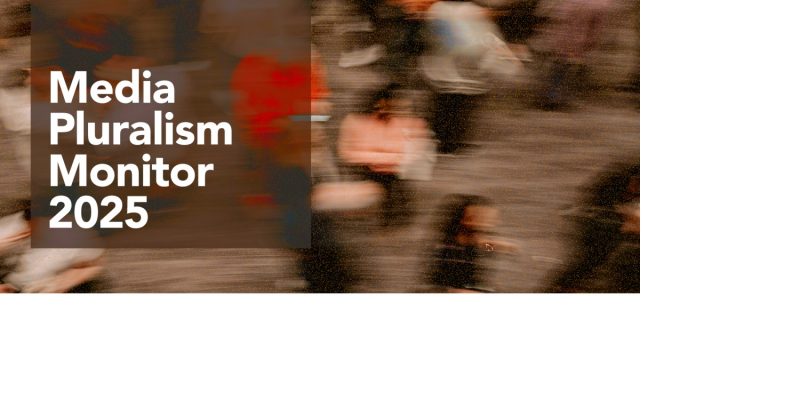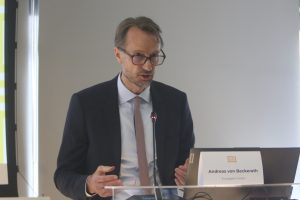Conducted by the Centre for Media Pluralism and Media Freedom (CMPF), the Media Pluralism Monitor (MPM) offers one of the most comprehensive assessments of media conditions in Europe. While it evaluates a wide range of topics, the 2025 edition showcases a growing difficulty in the media landscape, caused by decreasing working conditions, employer instability, and an increasingly hostile political climate.
Digital safety emerged as the greatest concern, with journalists increasingly targeted by hacking, doxing, surveillance or harassment online. All of these forms of intimidation have been particularly prevalent for journalists covering difficult and polarizing issues such as environmental degradation, corruption, elections, the war on Gaza and the war on Ukraine. All too often the perpetrators of these acts remain anonymous online and journalists feel powerless, especially when they often depend on authorities to step in (something that all too often does not occur.)
Worsened working conditions also became noticeable within the media sector. More than 30 percent of journalists now work as freelancers in the EU, and a significant number of freelancers do not have stable contracts, health care coverage or pensions. In some Eastern European countries, entry level reporters earn as little as €500 a month, which is considerably less than their national median earnings, and even in wealthier Member States, starting salaries are often barely above the minimum wage. The extensive use of AI in newsrooms has contributed to job losses, and with an estimated 20 percent of newsroom tasks now automated, this has not helped either. In 2024 alone there were over 2,000 job losses at major public broadcasters in Italy, France and Germany. And when you consider the lower levels of unionization (fewer than half of journalists belong to unions that give collective agreements) many are leaving the field entirely.
According to the 2025 MPM’s interactive treemap data, Greece leads with the highest recorded risk score under the working conditions indicator at 74%, followed closely by Türkiye at 71% and Serbia at 68%. Bulgaria scored 65%, while Moldova, Albania, Croatia, France, Italy, and Spain all hover at 57%. In contrast, Denmark (10%), Luxembourg (15%), Estonia (15%), Finland (29%), and Ireland (30%) represent the lowest risk countries in this category. These figures clearly reflect a west-east divide in journalistic protections and institutional safeguards.
While there are some good news stories, such as collective bargains being made recently, in Italy and Greece, the trajectory around Europe is still concerning. Journalistic unions and professional organizations, for the most part, do not have sufficient power when advocating for better protections. Verbal assaults or smear campaigns, typically instigated by public figures, have become normalized in some countries, like Italy, Belgium and Croatia.
The report also outlines how vulnerable identified groups, such as women and LGBTQ+ journalists, are at an even greater disadvantage. They continue to be subjected to workplace incivility, discrimination, and brutality, while few countries in Europe collect meaningful data that could adequately assess or assist with their situation.
In this context, candidate countries for EU accession (Albania, Montenegro, North Macedonia, Serbia and Turkey) are performing much worse on nearly all indicators than EU Member States. Public access to information is being hindered via bureaucratic processes or the silence of long administrative waits before a response. Practical means to protect whistleblowers are often not there, or are not functional, meaning that journalists investigating sensitive matters don’t have any institutional safety nets to rely on. In Turkey, there are at least 18 journalists currently incarcerated based on their journalism, with illegal surveillance cases being documented amongst several candidate countries.
Press freedom is also being further undermined by strategic lawsuits against public participation (SLAPPs). None of the candidate countries instituted specific anti-SLAPP laws, while most judicial frameworks are not able to recognize (or dismiss) SLAPPs. In Serbia, SLAPPs are routinely employed as an intimidating deterrent by powerful state actors in conjunction with powerful organized crime groups.
The report also highlights the lack of political independence of public broadcasters in many countries, starting with Turkey, Hungary, Malta, Slovakia, Bosnia & Herzegovina, Italy, Croatia, Greece, Serbia, Romania and Poland. It will be important to measure the progress expected following the entry into force of the European Media Freedom Act (EMFA) on 8 August.
“The MPM report illustrates that journalism in Europe is an increasingly more difficult profession with digital risks, economic decay, legal harassment, and political play,” said EFJ President Maja Sever. “We expect public authorities and media employers to launch wide ranging reforms to better protect journalists and media workers. What is at stake is not a profession, but the right of European citizens to be informed”.
Source: EFJ




